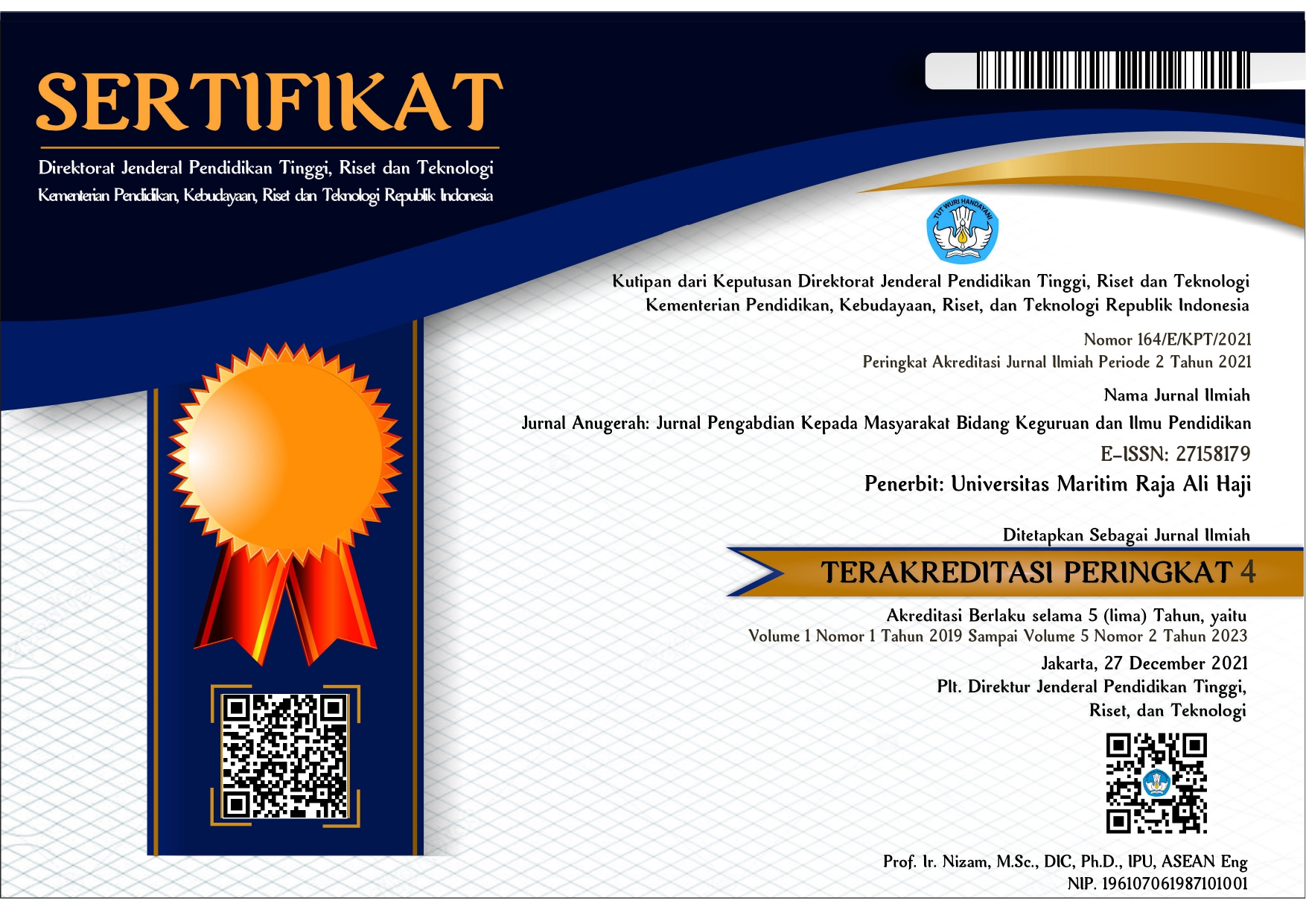Penulisan Soal Literasi Numerasi bagi Guru SD di Kabupaten Ponorogo
DOI:
https://doi.org/10.31629/anugerah.v1i1.1631Keywords:
Workshop, Literacy Numeracy, Elementary SchoolAbstract
The change in curriculum aims to improve the quality of content and learning. One of the backgrounds of the curriculum revision is based on international tests on students’ competency and literation, such as PISA. In PISA, literacy-numeracy becomes one of the essential evaluation of mathematics competency. Therefore, the use of literacy problems should be administered in the primary school class. In order to implement the literacy-numeracy problem in the class well, the teachers are required to be able to develop functional literacy problems. This workshop on writing literacy-numeracy for elementary teachers in Ponorogo City was conducted in three stages. The first stage collected the fundamental knowledge of the teachers about what they understand about literacy-numeracy. The second stage was a discussion about the literacy-numeracy and its both background and classroom implementation, especially in elementary school. The last stage was the teachers’ workshop in arranging the literacy-numeracy problems. In the end, the problems developed by the teachers were analyzed based on literacy-numeracy criteria. Besides, the participants also gave feedback using a questionnaire as the information for the effectivity of the workshop.
References
Arista, F., Marzuki, & Krenadi, H. (2014). Dampak pembelajaran tematik terhadap perolehan belajar peserta didik di sekolah dasar. FKIP Untan, 1–10.
Jayanti Ardianika Putri. (2017). Kemampuan penalaran matematis siswa SMP kelas VIII dalam menyelesaikan soal PISA matematika di Kota Kediri. Simki-Techsain, 01(02), 2017.
Kartikasari, M., Kusmayadi, T. A., & Usodo, B. (2016). Kreativitas guru sma dalam menyusun soal renah kognitif ditinjau dari pengalaman kerja. Prosiding Seminar Matematika Dan Pendidikan Matematika, (November), 431–442.
Kemendikbud. Permendikbud No. 21 tahun 2016 tentang Standar Isi Pendidikan Dasar Dan Menengah (2016). Indonesia.
Mukharomah, N. (2018). Program Sekolah Literasi Gratis (SLG) di STKIP PGRI Ponorogo. Jurnal Abdau : Jurnal Pendidikan Madrasah Ibtidaiyah,1(2), 305–317.
PISA. (2016). PISA 2015 Results in Focus. OECD. https://doi.org/10.1787/9789264266490-en
Prenzel, M., Blum, W., & Klieme, E. (2015). Assessing Mathematical Literacy. Assessing Mathematical Literacy: The PISA Experience. https://doi.org/10.1007/978-3-319-10121-7
Rahmawati. (2016). Analisis Hasil TIMSS 2015. 2016.
Setiana, N. (2016). Pengaruh Implementasi pendekatan tematik terhadap pemahaman konsep dan kreativitas siswa dalam pembelajaran ilmu pengetahuan sosial. EduHumaniora | Jurnal Pendidikan Dasar Kampus Cibiru, 3(1). https://doi.org/10.17509/eh.v3i1.2800
Suyitno, A. (2013). Mengembangkan kemampuan guru matematika dalam menyusun soal bermuatan literasi matematika sebagai wujud implementasi kurikulum 2013. AKSIOMA: Jurnal Matematika Dan Pendidikan Matematika, 4(2). https://doi.org/DOI: http://dx.doi.org/10.26877/aks.v4i2/Septembe.552
Wardono, Waluya, S. B., Kartono, Mulyono, & Mariani, S. (2018). Literasi matematika siswa SMP pada pembelajaran problem based learning realistik edmodo. Prisma, 1, 477–497. Retrieved from https://journal.unnes.ac.id/sju/index.php/prisma/article/view/20138















